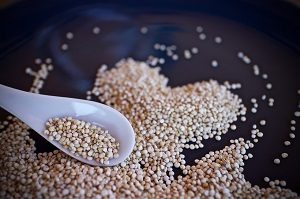
The Smartest Animals in the World
November 2, 2022
Itching or Scratching in Rabbits
November 3, 2022
Quinoa is a grain full of nutrients good for both dogs and humans. Quinoa is a gluten-free seed, which makes it an ideal alternative to other grains, and it also happens to be highly nutritious for humans.
From protein to calcium, this edible seed is full of vitamins, essential amino acids, and minerals that support everything from improved digestion to a healthier look of skin and hair.
But just because a food is healthy for humans doesn’t always mean it’s good for dogs. The good news is that when it comes to quinoa, it’s safe to give your dog a little too. In fact, it’s a common ingredient in some high-quality dog foods because it’s a healthier alternative to corn, wheat, or other starches that are often included in the pup grains.
The benefits of quinoa in dogs
Quinoa is one of the healthiest seeds available for human consumption. It is native to South America and has been consumed for more than 4.000 years. Today it has become one of the most popular superfoods, and these nutritional benefits extend beyond humans as quinoa offers a number of health benefits for our dogs too.
The list of nutrients found in quinoa is seemingly endless. These seeds contain complex carbohydrates, essential amino acids, fiber, vitamin E, iron, calcium, phosphorus, zinc, copper, manganese, thiamine, magnesium, and potassium, among others.
These nutrients are associated with everything from increasing your dog’s energy and enhancing its brain function to improving metabolism and regulating blood sugar. When it comes to appearance, the vitamins found in quinoa can help your dog keep its fur, teeth, and nails shiny and healthy.
You might also like my articles on whether dogs eat apple, pumpkin, or coconut.
Quinoa is an even better snack for active breeds because its nutrients can help build and repair muscles while promoting strong and healthy bones.
Potential health problems in dogs when consuming too much quinoa
There is a type of chemical called saponin that is found naturally in quinoa and could harm dogs. The quinoa plant produces saponin in an attempt to protect itself from insects and is considered to be potentially irritating to the intestines both for humans and their canine friends. While it’s not a huge problem, because the amount of saponin typically found in quinoa is most likely not enough to lead to health problems, it’s possible that a dog’s digestive system is more sensitive to it. However, washing the quinoa seeds before cooking them should remove any trace of saponin.
 Another thing to consider is that animals usually do not have digestive systems that can easily process plant-based food. Some dogs cannot tolerate oxalates, an organic compound found in many plants, as they are often insoluble and can cause inflammation.
Another thing to consider is that animals usually do not have digestive systems that can easily process plant-based food. Some dogs cannot tolerate oxalates, an organic compound found in many plants, as they are often insoluble and can cause inflammation.
That means you might want to be more careful especially when you’re giving quinoa seeds to a pet who already has arthritis.
Although quinoa is technically the seed of a plant, reactions to plant consumption could include salivation, oral pain and inflammation, poor appetite, or snout touch, so make sure you tell your veterinarian immediately if your dog has any of these symptoms after eating quinoa. And, of course, stop trying to give it to your dog.
When it comes to sharing quinoa seeds with your canine friend, make sure you cook your dog’s own portion without spices or other additives. It may not taste so great for you, but your dog will most likely devour it.
Most quinoa foods contain ingredients such as salt, onions, and garlic, most likely to mask the somewhat bitter taste, and are all potentially toxic to dogs. Also, be sure to give your pet only cooked quinoa, as it is easier to digest for them.
How to offer your dog quinoa
As with any human food, you’ll want to talk to your veterinarian before giving quinoa to your dog. If your dog has never eaten quinoa before, you’ll want to start with a small amount. Just because it can be healthy for both humans and dogs, that doesn’t mean any dog will be able to digest it.
A teaspoon, or a little more for larger breeds, is enough to start with. It can be mixed into their food, served directly from the spoon, or baked in a homemade dog snack.
Be careful!
After feeding your dog quinoa, pay attention to possible signs of stomach stress, such as vomiting, constipation, or diarrhea. If any of these symptoms occur, warn your veterinarian.
